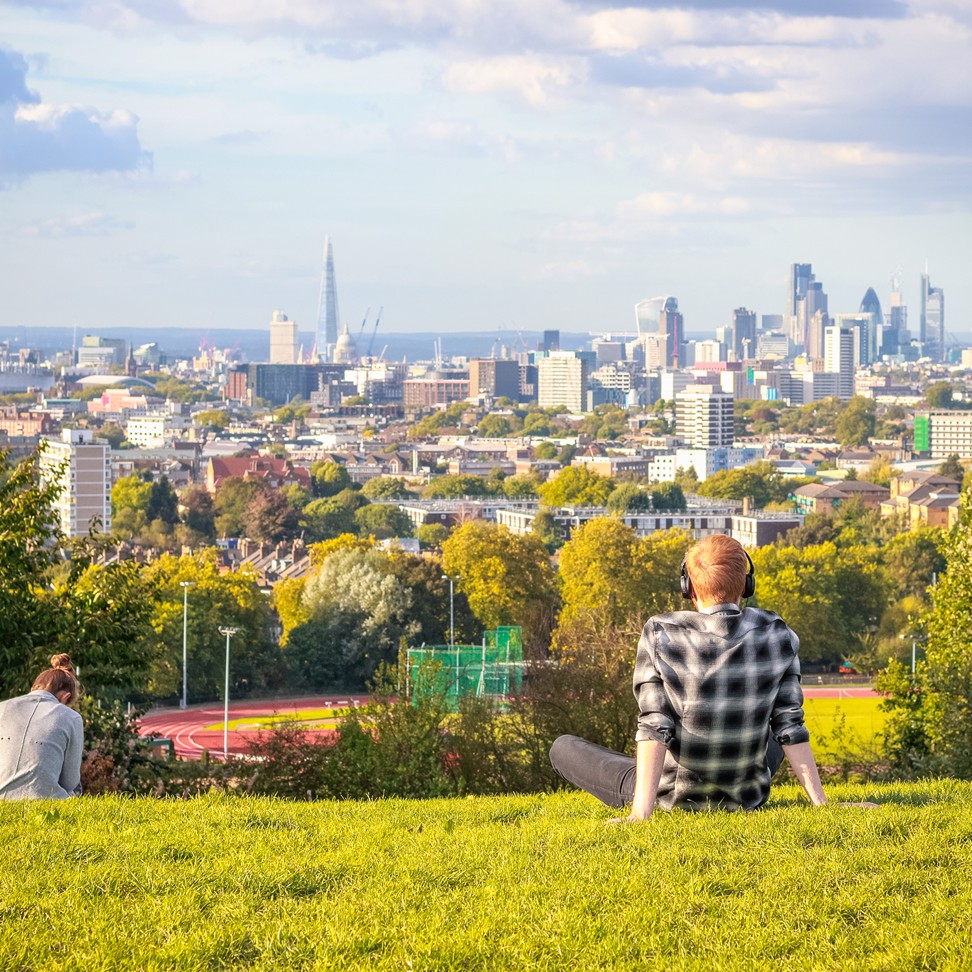Contradictory at the best of times, Beirut is a city of blind corners that approach you at breakneck speed.
It is a place in which you will find a fascinating mix of religious persuasions, spanning Druze to Islam and a raft of Oriental influences crammed into one beautiful, boisterous and at times overwhelming city.
What to do in Beirut
Saunter along The Corniche
Start your mornings with a leisurely stroll along The Meditteranean coastline
Beirut’s Corniche is to Lebanon what Havana’s Malecón is to Cuba. Built under the French Mandate of Syria and Lebanon, this 2.9 mile long promenade separates the crashing waves of The Mediterranean from the streets of Beirut and offers pleasant views of the summits of Mount Lebanon in the distance.
Walk, run, skate or join the old fishermen as they cast their lines into the choppy waters and keep an eye open for the endearing pigeon rocks – two natural offshore rock formations in the neighborhood of Raouché.
Believe the hip – explore Gemmayzeh and Mar Mikhael
Mar Mikhael is home to numerous street art works, such as these coloured steps
If you are looking for a bit of edge, Gemmayzeh is just the place. Gentrified but not snobbish, unpolished but accessible, Gemmayzeh is home to numerous narrow streets and historic architecture. It is also an area of Beirut that is rich in street art.
Venture further north into Gemmayzeh until you hit the frenetic Mar Mikhael hood, where the volume of bars and cafes makes it a bar-hopping mainstay. Splash a hint of color into your stay in Beirut with a visit to the famous colored steps while you’re in the area.
Relax at The Sfeir Semler Gallery
“No condition is permanent” – a work from a previous exhibition at the Sfeir Semler gallery @ Saima Mir
The Sfeir Semler Gallery focuses on contemporary art, with emphasis on conceptual and minimal art, in its bid to showcase works by pivotal Arab artists.
When the pacey streets and their clattering become overwhelming, this is an ideal location for a bit of reprieve and contemplation in the company of some iconic works.
Gain perspective at Shatila refugee camp
Visit Shatila and gain perspective on some of Lebanon’s present-day challenges @ GAME Lebanon
While it may not appear in many a guide to Beirut, a visit to Lebanon would be incomplete without a trip to one of its refugee camps, home to thousands of Palestinians, Syrians and other Arab nationalities who have fled war and conflict in their countries of origin. This is also a facet of Beirut, in addition to the other qualities of the city.
A visit to Shatila is not entirely without its perils so if you do decide to visit, be sure to do your research and contact one of the many NGOs who work in the area so that you can plan your visit through them. Be respectful to its residents when you are in the area and ask for people’s consent before taking pictures.
Go for a walk in Horsh Beirut
Relax in the lush confines of Horsh Beirut – Beirut’s largest green area @mayolight
Stretch those legs at Beirut’s largest open park, Horsh Beirut, which was reopened to the public in 2015 after a lengthy hiatus following reconstruction after the Lebanese civil war. Once a lush woodland extending over many miles, Horsh Beirut has lost some of its swagger and is much smaller today but is nonetheless a relaxing spot to recharge.
A tale of 2 buildings — The Egg and The Mohammad Al-Amin Mosque
Beirut is a city of juxtapositions, exemplified here by The Egg and The Mohammad-Al Amin mosque
Lebanon’s civil war has left their mark in Beirut. Nowhere is this manifested better than at the remains of a multi-complex city centre project that was bombed while under construction.
At the center of these ruins lies The Egg – what would have been a spacious cinema but is now a withering concrete mass. While you won’t be able to go inside The Egg, you can still get close enough to it to appreciate the concoction of melancholy, beauty and ambiguity that it gives off.
The Egg is a favorite among locals, many of whom have campaigned for it to be a permanent fixture in Beirut’s architectural landscape. For now, it stands defiant, in the shadow of the Mohammad Al-Amin mosque, amidst an uncertain future rocked by potential reconstruction plans.
This elaborate mosque (inaugurated in 1998) decorates Beirut’s skyline with its 236 feet high blue minarets and is one of the symbols of the nation’s resurgence from its civil war in the 70s. Built in the mold of Istanbul’s Byzantine-epoch Hagia Sophia mosque, it is both imposing from the outside and elaborately decorated on the inside.
Paint Beirut red
Make merry at one of Beirut’s famous clubs, O1NE Beirut
Boasting of an unrivaled club scene, Beirut is very liberal when it comes to its nightlife, compared to much of the Middle East.
Of the many bars and clubs on offer, B 018 – a gargantuan tomb-like space frequented by some of the biggest names in electronic music, stands out as THE place for a night out in Beirut.
Kick back and watch the sunrise as the roof of this basement behemoth folds to let the light in at dawn.
Rivaling B 018, and located in Beirut’s central district, O1NE Beirut is another of the city’s clubbing bastions worth visiting. The club is as impressive inside as it is on its iconic exterior, which is draped in colorful street art designs.
For a less fanciful night out, try some of the smaller bars and pubs around Hamra street – one of Beirut’s main avenues, that is also home to a wide range of shops and cafes by day.
Alpine slopes and seaside après-ski
Ski due West from Mzaar and you will start descending towards Beirut
Adrenaline junkies and thrill seekers will find plenty of spoils in and around Beirut. In the months of December to early April, you can ski or snowboard down the slopes of the Mzaar Kfardebian mountain range, a mere 31 miles to the east of the city.
On a clear day, enjoy the view of Beirut and The Mediterranean yonder. Given its proximity to Beirut, you can ski in Mzaar in the morning and relax on The Corniche in the afternoon.
Where to eat in Beirut
Cafe Em Nazih
Cafe Em Nazih is part of the Saifi Urban Gardens complex, located in the heart of the Gemmayzeh district. The lush setup includes a hostel, rooftop bar, language school and even artist studios.
Feast on local dishes such as grilled halloum (halloumi), msabaha (breakfast hummus) and fried kebbeh (meat and bulgur balls) and while you’re here, be sure to try the plate of the day for a unique Lebanese culinary experience.
Falafel Freiha
Complete your Beirut experience with a well-made falafel or shawarma in spartan surroundings where focus is almost entirely on the food. Sitting in the packed confines among an erstwhile local crowd is every bit a part of the experience here.
As the name suggests, falafel is the specialty here, though you will also find basic meat sandwiches and shawarma to feast on at great prices.
The Gathering
Feast on gastronomic delights in The Gathering’s vast courtyard @ The Gathering
Staying true to a staunch belief in organic products, The Gathering serves up a tasty mix of culinary delights, chiefly of Italian or French origin.
You’ll find ample opportunities to relax over a good glass of wine in the confines of its spacious courtyard and its centrally-placed olive tree.
Where to stay in Beirut
The Mayflower Hotel Beirut
A symbol of Beirut’s golden days – relax in the cool confines of The Mayflower
The Mayflower is one of Beirut’s oldest privately-owned hotels. In its heyday, it was one of the hot spots frequented by the waves of tourists who thronged to Beirut in from far and wide in the late 1950s and early 60s. Retrace the good old days here with a visit to the Duke of Wellington pub, whose decor reverberates with a longing nostalgia for the past.
Monroe Hotel
Take in the splendid views of the Mediterranean from your room at Beirut’s Monroe hotel
Another centrally-located hotel, Beirut’s Monroe hotel features rooms with partial or full sea views overlooking the bay area and the Mediterranean beyond it. Treat yourself to a visit to the solarium or sauna while you’re here and enjoy some of the scrumptious international cuisine at the hotel’s own restaurant, The Sanderson.




